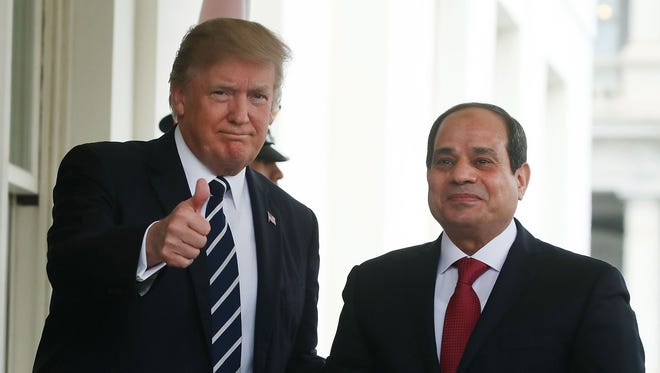Trump cheerleads for the torturers: Brian Klaas
Public adoration for the worst of the worst is taking a buzz saw to our soft power.

In studying authoritarianism around the world, I’ve grown used to a now familiar pause in conversation — the sound of a torture victim’s voice breaking as he struggles to recount the horrors he endured at the hand of a despot. Some were hung naked from a metal rod for days. Others were beaten until they entered a coma.
I’ve interviewed hundreds of pro-democracy reformers from Belarus to Thailand. Most plead with me to persuade my government — the government of the United States — to provide them with just a bit more support, a bit of hope against an authoritarian tyrant.
They want freedom. They want basic human rights. They want democracy.
The president of the United States is not on their side.
Instead, he consistently sides with the torturers and the oppressors over the tortured and the oppressed. That appalling decision will not only make the world a darker place, it will also damage America’s strategic interests.
President Trump has repeatedly said that “torture works.” He praised Iraqi dictator Saddam Hussein and said he wished his brutal regime was still in power. Since becoming president, he has praised Russia's Vladimir Putin, an authoritarian despot who murders journalists and dissidents. Trump congratulated President Recep Tayyip Erdogan for rigging a referendum that effectively dismantled democracy in Turkey. He invited Philippine President Rodrigo Duterte to the White House, even though he has boasted about personally murdering people and is using death squads to kill thousands. Trump embraced Egypt’s military dictator, President Abdel Fattah al-Sisi, at the White House in April, though Sisi killed at least 900 people in a single day and routinely tortures his opponents.
This week, he praised North Korean leader Kim Jong Un as a “smart cookie” whom he would “be honored” to meet. Trump even went so far as to suggest that Kim’s ability to consolidate power in the dynastic dictatorship was “incredible,” even though Kim did so by assassinating relatives and murdering political opponents with flamethrowers and anti-aircraft guns.
Why Trump may be about to decapitate North Korea: James Robbins
World history according to Trump: Gabriel Schoenfeld
This leaves us with a series of uncomfortable truths about the lack of moral values in the White House:
The president of the United States has had harsher words for Meryl Streep and Nordstrom than he has for Putin, Erdogan, Duterte, Sisi and Kim.
Trump attacks our free press as “the enemy of the people” but defends dictators who kill, jail or torture journalists.
He has tweeted about “human rights” only once — to mock them. In comparison, he has tweeted about crowds 248 times and called someone a “dummy” on Twitter 77 times.
And in fabricating his bogus claim that President Obama wiretapped Trump Tower (he didn’t), Trump claimed his predecessor was a “bad (or sick) guy!” Mr. President, have you considered that perhaps such language would be better suited for someone who literally burns political opponents to death with a flamethrower for his own pleasure?
There are many issues that divide Americans. Even so, we should be able to agree that ruthless tyrants who brutalize their people are bad (and sick!) and unworthy of the admiration of us or our government.
That’s why we certainly should be outraged that our president lacks a moral compass. But we should also be worried. Trump’s unabashed adoration for dictators and strongmen across the world will accelerate the global decline of democracy, undercutting U.S. interests simultaneously.
As I’ve argued in my book, the United States has often had a two-faced approach in dealing with unsavory regimes around the globe. From Nixon to Reagan to Obama, U.S. presidents have promoted the lofty ideals of freedom and democracy, while simultaneously getting into bed with a few ruthless regimes, such as Saudi Arabia. That’s a shameful approach — and one that stains the moral leadership of the United States and the soft diplomatic power that comes with it. Despite that occasional hypocrisy, the U.S. government has been a genuine beacon to oppressed people worldwide for decades.
POLICING THE USA: A look at race, justice, media
John Bolton: China's choice on North Korea
Trump is something new and much more sinister. He’s disturbingly consistent. Gone is the lofty rhetoric about freedom or democracy. Instead, he repeatedly sides with despots and dictators over democrats. He doesn’t hold his nose and try to work with disgusting regimes for strategic reasons; he simply admires their “strength” or their “incredible” ability to crush dissent from the ranks of societies they terrorize.
That signal matters. American soft power is crucial to achieving diplomatic goals without war. Trump’s public adoration for the worst of the worst is taking a buzz saw to our soft power — undercutting U.S. interests in the process.
It gets worse. Across the globe, brutal regimes look to Washington to figure out what they can get away with. Tough talk and condemnation deter the most egregious abuses; praise from the White House ensures them. Unfortunately, Trump has shown he isn’t interested in being a referee in defense of democracy — he’s cheerleading from the sidelines on behalf of the despots.
Unless he begins to condemn rather than celebrate tyranny, democracy will decline even faster worldwide, authoritarianism will continue to surge, and America will have sacrificed its soft power and moral leadership for nothing.
Brian Klaas is a fellow in comparative politics at the London School of Economics and Political Science and author ofThe Despot's Accomplice: How the West is Aiding and Abetting the Decline of Democracy. Follow him on Twitter @brianklaas.
You can read diverse opinions from our Board of Contributors and other writers on the Opinion front page, on Twitter @USATOpinion and in our daily Opinion newsletter. To submit a letter, comment or column, check our submission guidelines.